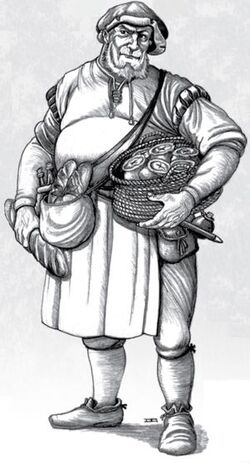"I'm afraid you'll have to remove your backpacks in this shop and leave polearms at the door. The owner deducts broken ceramics from me wage."
- —Frida, part-time shopkeeper[3a]

A burgher of the Empire
A burgher[1a] or townsman[3a] was the rank or title of a privileged citizen of towns and cities in the Empire and certain other civilised realms of the Old World who are usually the owners of businesses engaged in an artisanal craft or some other commercial activity such as trade or banking. Burghers formed the pool from which town and city officials could be drawn and they and their immediate families formed the social class of the Old World's newly-emergent "middle class."[1a]
As cities have become more and more important to the Empire, a new class of citizen has emerged: the burgher or townsman. Burghers -- or their ancestors -- clawed their way up from subsistence peasantry and made new lives for themselves in the towns and cities. Now they are the glue that holds the urban society of the Old World together. They are neither as despised as the peasantry nor as exalted as the nobility. While they suffer the most from plague, living in tightly packed urban neighbourhoods as they do, they would not leave the city for a life of hard toil in the countryside. In their minds, towns and cities breed opportunity, not just disease.[1a]
There is little social mobility for most burghers. However, the shrewdest or most industrious may gain promotion, eventually coming to own businesses or property in a town themselves. The most successful townsmen join the local civic bodies, becoming town councillors or even burgomeisters. These officials are among the most respected figures in a town or city, and maintain an equal station with guildmasters and merchant princes.[3a]
A wide array of professions are counted among the burghers: artisanal shop owners and innkeepers; petty merchants and traders; excisemen, lamplighters, and civic toll-keepers; bankers and clerks; washers and ostlers; hawkers and newssheet vendors.[1a][3a]
A Day in the Life of a Burgher[]
A burgher's life begins with the dawn. No matter his job, he must wake early to prepare for it. A shopkeeper will rouse apprentices, a clerk will begin to warm his small office and sort through the paperwork from yesterday, a state or city official will take a quick breakfast and begin his long trek to work.[2a]
The day will usually pass as the day before, and the day after. The burgher must constantly work to please others. There are impatient customers, angry nobles demanding answers to their questions, and irate merchants wondering when their forms will be completed. Daily life is a constant game of inflicting indignities on those whom it is safe to harass, while humbly accepting them from those who must be heeded. On rare occasion, there are moments of unexpected pleasure -- a wealthy man is pleased with his work and promises to recommend the burgher, or he has a chance to humiliate and crush a rival without fear of retribution.[2a]
At the end of the day, the burgher counts his coin, and compares it to his expenses. If there's even a small bit left over, he can store it, in the hopes he, or his children, may someday rise in station. On occasion, he dreams of adventure, of great risks and great windfalls, of the unexpected and the unplanned crashing in on his ordered, plodding life. For some this is a dream; for others, a nightmare.[2a]
Townsmen usually take one or sometimes two days off per week. Some save money to go on a pilgrimage, leaving home for months at a time. Those burghers who are skilled labourers and craftsmen need not worry about finding work upon their return; their services are always in demand. However, those who are not may need to negotiate time off with their employer.[3a]
Guild Affiliations[]
A man alone is a man brought down! No matter a burgher's trade, he does it with the aid and consent of some sort of guild or brotherhood. The guild serves two functions -- to protect its members from the outside, and to police the quality of its members' goods and their behaviour so as to avoid trouble from the nobility, the churches or the state. The guild will set weights, measures, standards, and pay scales. It will regulate the total number of professionals in a town to prevent unnecessary competition, and certify any newcomers as fit to practice their trade.[2a]
It will serve to provide support in times of crisis, a pension for widows, and so on. It will also demand obedience. Guildmasters can end a a burgher's career with a word, and a craftsman blackballed from a guild may never work again.[2a]
Due to the existence of the guilds, anyone who wrongs a burgher of a town will face the wrath of all the guilds, not just the burgher's own. Guilds veer between honest and corrupt, and the forces of Chaos find them excellent targets. Control a few key men, and you control all the professionals in a large city.[2a]
